The San Jose Sharks and Anaheim Ducks will get together for a playoff series for just the second time. The first time occurred in 2009 when the Ducks upset the Presidents’ Trophy-winning Sharks in six games.
There is plenty of history between these teams, including many low-scoring, physical games which came down to the final minute. Of course, it’s not always low-scoring; sometimes it turns into an all-out brawl-fest.
The trend continued this season. In four games this season between the teams, three went to the shootout.
Sharks and Ducks, 2009 Playoffs
One would have thought the Sharks and Ducks would have met more than once, but this isn’t the case, even though both teams have been playoff regulars for a decade or more. The lone series proved pivotal for the Sharks. The Ducks, two seasons removed from winning a Stanley Cup, faced a Sharks team with the league’s best record. The matchup came in the playoffs’ opening round. For Ducks goalie Jonas Hiller, it was his finest hour. He posted a pair of shutouts and despite the Sharks averaging over 38 shots per game, Hiller allowed just 10 goals, posting a bonkers .957 save percentage.
The series had plenty of moments, but the one which many remember most vividly is the opening faceoff for Game 6, when the two elite centermen dropped the gloves and fought. Yes, it was Joe Thornton fighting Ryan Getzlaf.
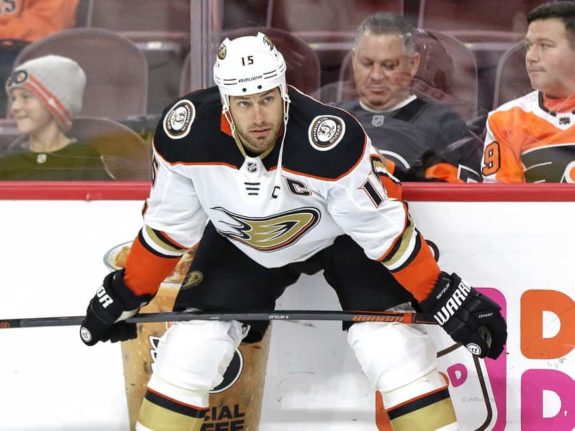
The Sharks lost the series, and perhaps it marked a franchise turning point. The Sharks had spent most of their existence as a valiant underdog, but this wasn’t the case in 2009. They were supposed to win. Instead, people spoke of a team that gripped their sticks too hard in the big moments. The once-admirable underdogs morphed into underachiever territory and, well, the bloom was off the rose. And while it didn’t show immediately, the fan base has never quite been the same.
The Canucks Factor
For the Sharks, an unexpected piece of history comes into play from a single, pivotal game in 2011. Two players currently on the Ducks roster played important and villainous roles in Game 5 of the Western Conference Final between the Sharks and Vancouver Canucks, ending perhaps the most snake-bitten series in Sharks history. The Sharks, leading late in the game by a 2-1 score, iced the puck. With 14 seconds remaining, a Ryan Kesler goal tied the game at 2-2 and sent the game into overtime.
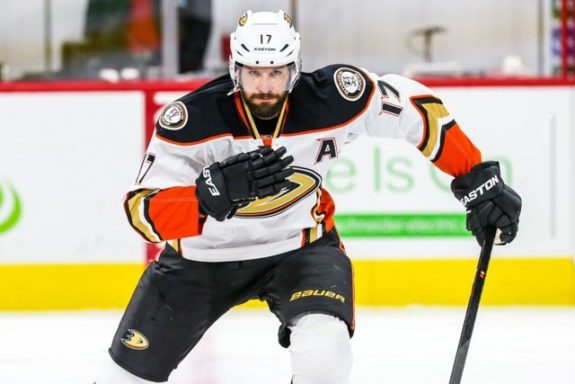
The game was electric. One moment summed up the intensity: Douglas Murray’s monster hit on Kesler as he raced up the ice. In the second overtime, with both teams playing good, tough hockey, a fluke goal decided it. An odd bounce off a stanchion left almost every player on the ice vainly looking for a puck which appeared to be wrapping around the boards. But it didn’t wrap around at all. It bounced backwards and toward the blue line. Canucks defensemen Kevin Bieksa noticed the puck at his feet after the odd carom and sent a weak shot to the net. With no one, including Sharks goalie Antti Niemi, aware of the puck’s whereabouts, it slid past him for the series-ending goal.
For a Sharks team that was playing extremely well (and outplaying Vancouver), Kesler’s last-second goal and a fluky bounce which wound up on Bieksa’s stick ended a season for what was among the best Sharks team ever.
Kesler is now a key piece on the Ducks’ roster. He had a rough season, but his ability to make clutch plays is what matters most. Bieksa is recovering from hand surgery, but his availability timeline (two to five weeks from March 16) may get him into this series. The Sharks have more than just Ducks history staring at them in this series.
Returning Combatants
While most of the players have moved on from the 2009 series, a handful are donning the same logo for this series. For Anaheim, this includes Getzlaf (who has been brilliant this season), Corey Perry, and Francois Beauchemin (who left and returned to the Ducks). Joe Pavelski and Marc-Edouard Vlasic are the Sharks who were in the 2009 battle and will play this series. Whether the injured Thornton plays this series is an open question.
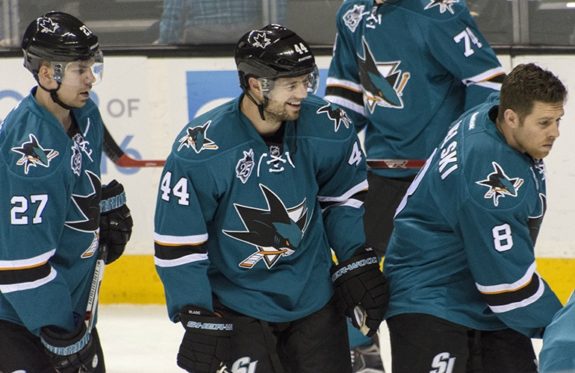
Also returning is Anaheim head coach Randy Carlyle, who coached the team in the 2009 series. And while this is important to him, it is even more important to Sharks head coach Peter DeBoer. In an interview, DeBoer laughed off the revenge factor, indicating he wasn’t even sure where he was coaching in 2009. But this series is important for his future. In this complicated season, DeBoer must be a positive factor for the Sharks; his report card is heavily weighted towards what happens in the postseason.
Sharks, Ducks and Injuries
Both teams have injury concerns, concentrated in specific areas. For the Sharks, the issue is at forward. Evander Kane isn’t fully healthy, as DeBoer admitted after the regular-season finale. Kane has been a major difference-maker for San Jose, scoring nine goals in just 17 games and going plus-5. Further, his physical presence allows other Sharks forwards to have better matchups on other lines. Kane has shown great chemistry with Joe Pavelski. If Kane plays effectively, it’ll be a big boost for the Sharks. Kane creates mismatches. When healthy, he is a force on his line and will consume the Ducks best defenders, freeing up Logan Couture’s line. But if he struggles, the Ducks can move their best defenders to handle Couture’s line and the Sharks attack will sputter. If Kane’s health is an issue, it’ll be a big problem.
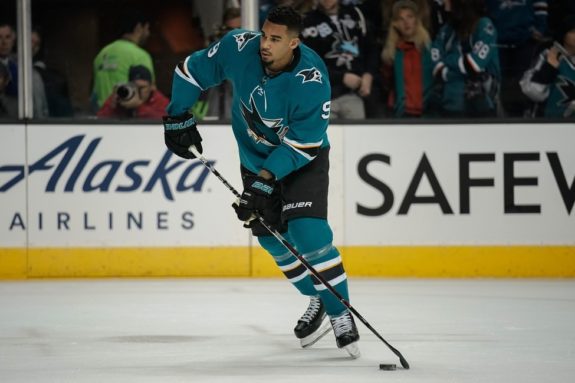
The Sharks have plenty of forward depth, but the injury list is lengthy. It includes Eric Fehr, Barclay Goodrow and Melker Karlsson, all lineup regulars when healthy. And the Sharks are missing Thornton, a big piece of the puzzle, especially on the power play.
The Ducks are dealing with their own health issues, and theirs are weighted on the backend. Defenseman Cam Fowler, the team’s ice-time leader and key piece of the Ducks power play, isn’t likely to play in this series. Add this to Bieksa’s status, and the Ducks are challenged on the blue line. Starting goalie John Gibson is also hurting, though the quiet coming from the Ducks suggest he is close to returning. Gibson will get plenty of votes for the Vezina Trophy as the league’s best goalie. His backup, veteran Ryan Miller, has done well in Gibson’s absence.
Point, Counterpoint
In truth, there is little reason to favor either team in this series. For every point made favoring one team, there is a counterpoint of comparable merit. For example, the Sharks are among the leaders in scoring from the defense. The superb Marc-Edouard Vlasic scored double-digit goals for the first time in his career, played his usual brilliant defense and didn’t have a stick penalty called against him all season. Hs partner, Justin Braun, had 28 even-strength assists. Not bad from one of the league’s premier shutdown defensive pairings. Yet Anaheim has four defensemen who are plus-12 or better, led by Josh Manson’s plus-34—and he had 30 even-strength assists. The Sharks might not even start a player who is plus-12 or better. Leading goal scorers? Rickard Rakell potted 34 goals for the Ducks in 77 games, while Couture scored 34 for the Sharks in 78 games.
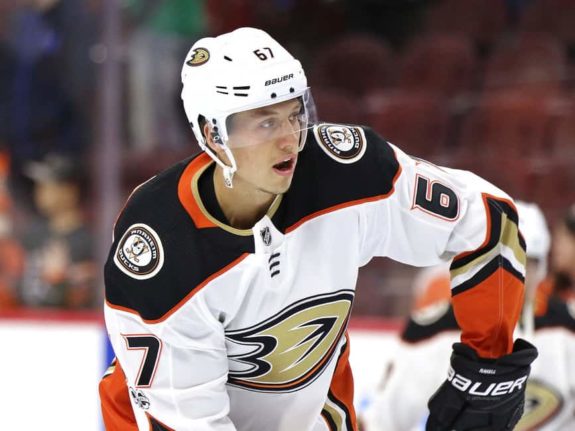
One might tout the Sharks’ superb penalty kill, the league’s best this season. Alas, Anaheim has killed 90 percent of penalties over the last 22 games. Point, counterpoint.
There are exploitable holes. The Sharks’ power play has struggled without Thornton. No doubt, the Ducks, already an aggressive team, can be more aggressive until the Sharks demonstrate they can score with the extra man. Anaheim’s blue line injuries make them shaky after the top pairings. The Sharks will look to exploit the Ducks’ bottom defensive pairing.
The Series Key
Both teams have terrific veteran leadership, some outstanding players on defense and solid goaltending. Both have been well-served by younger players evolving nicely. The Ducks are a heavy team featuring big players like Corey Perry and Hampus Lindholm. The Sharks are driven by their power forwards, including Kane, Tomas Hertl and Timo Meier, all 20-goal scorers this season.
Injuries will play a role, odd bounces can play a role and perhaps a playoff newcomer will make a difference.
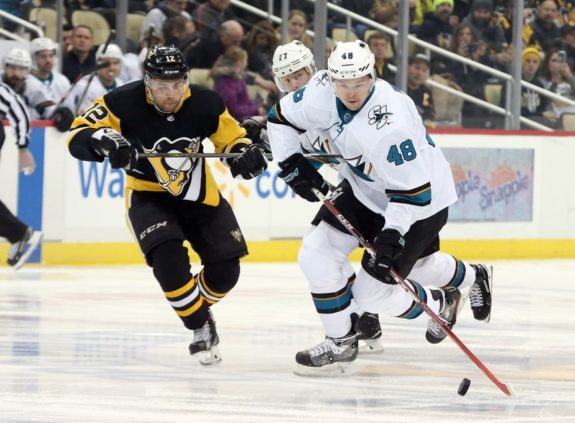
I’ll throw out the head-to-head regular season results and the overall records, too (though these both suggest this will be a close series). The Sharks stumbled in the home stretch, losing five of their last six. I’ll throw this out too. The home-ice advantage enjoyed by Anaheim? It’s meaningless.
Both teams will be thrilled to have short and easy travel. Last season, Anaheim had playoff series against Calgary, Edmonton and Nashville while the Sharks’ lone series was against Edmonton. Heck, even the airports in San Jose and Anaheim are close to the venues.
There is every reason to expect a war between two teams who pretty much define the term “battle-tested.” It unlikely this series will be over quickly; expect it to go six or seven very intense games. What will this series hinge on? Consistency. The team that brings its high-end game more consistently will win. Both teams are capable of winning this series and making a serious run at a Stanley Cup. I see this series as a coin toss. One which will have fans on the edge of their seats, right from the first puck drop.
Zeke’s Notes
For those wondering when Thornton might make a return, one can look back at the timetable for Tomas Hertl. Hertl, like Thornton, had surgery to repair a torn MCL. Hertl was injured on Dec. 19, 2013 and returned to the ice on April 11, 2014, 113 days later. Thornton left the game on Jan. 23, 2018. A similar recovery timetable has Thornton playing again in mid-May. No two injuries, surgeries and recoveries are the same, but the comparison gives a general sense of the time needed to return to NHL play following a torn MCL.